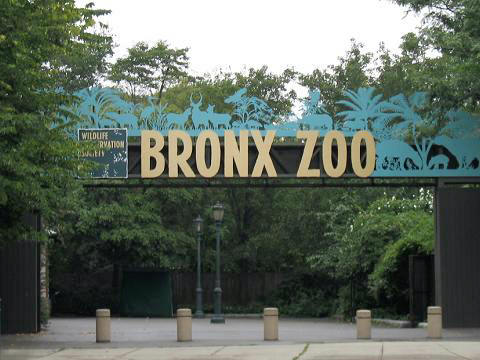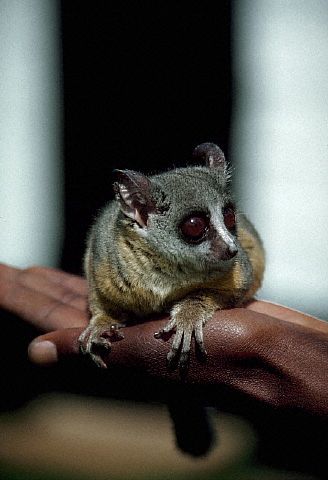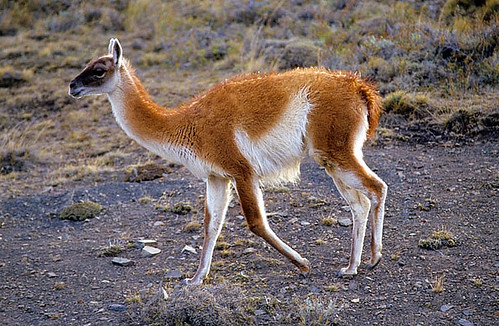tags: Bronx Zoo, Wildlife Conservation Society, NYC Life, economic hardships
New York City's Bronx Zoo, the largest metropolitan wildlife preserve in the United States, is being hit hard by the economy. To prevent a $15 million budget shortfall, zoo officials are closing four exhibits and evicting all their occupants, estimated to number in the hundreds of animals.
Zoo officials admitted in a New York City Cultural Affairs Committee meeting today that they are forced to relocate the suddenly homeless deer, bats, foxes, antelopes and other animals to zoos around the country.
"We had decisions that needed to be made about old exhibits, and at the same time we needed to deal with the fiscal reality which is upon us," said John Cavalli, of the Wildlife Conservation Society (Bronx Zoo).
The zoo will close the World of Darkness exhibit, which houses bats, porcupines, sugar gliders, and several primate species, including lemurs, bush babies (pictured below), and night monkeys.
Another exhibit scheduled to close is the Rare Animal Range, home to the Arabian oryx and blesbok, two types of antelope. The other two exhibits that are slated to close are homes to foxes, lemurs, caimans, Formosan deer and guanaco (pictured below), a close relative of llama.
A wild Guanaco, Lama guanicoe.
Guanacos are one of the species being relocated by NYC's Bronx Zoo due to fiscal deficits.
Image: James Parker (courtesy Trek Nature
Zoo officials chose which exhibits to close based on maintenance costs and popularity among visitors.
Last year, the Bronx Zoo attracted more than 2 million visitors and is home to roughly 4,500 animals on 265 acres of land. It is 114 years old and is one of the oldest zoos in the United States.
Sources:




Gotta save money so we can build sewers in Iraq..
RIP America
That is very sad news, and strange given that (from what I read the other day) the full amount of state funding had been restored to the WCS parks and they had even received a donation from Fisher Price. I guess there was more going on than just the looming threat of state budget cuts.
It probably does make sense to close the "rare animal range", at least. They have not had very much on display there over the past year or more. I walk by every time I visit but there is rarely anything on display even though it makes up a significant part of the park. I also have to wonder if the Bronx Zoo is shifting funding to the construction project they have going on right near the aquatic birds building (which mainly look like administrative offices).
What a shame. I used to live a short distance away and visited that zoo quite often, and I loved the World of Darkness.
I am now imagining a polar bear standing on the street, holding a cardboard sign reading: "Will growl for food."
"Zoo officials admitted in a New York City Cultural Affairs Committee meeting today that they are forced to relocate the suddenly homeless deer, bats, foxes, antelopes and other animals to zoos around the country."
"Zoos around the country." That is precious little information. Are there any details on what qualifies as a "zoo" ... and what doesn't? It would be tragic if any of these hapless animals ended up on display alongside jackalopes and multi-headed snakes in East BumbleMuck. Even worse were they to find themselves in a misnamed wildlife sanctuary (read: "game ranch") that serves as a feeder for canned hunts.
I live in Alaska where we have surely problems of our own when it comes to wildlife, but perhaps those of you who live nearby and have loved this zoo over so many years can monitor the situation and insist on some accountability on the matter.
"It would be tragic if any of these hapless animals ended up on display alongside jackalopes and multi-headed snakes in East BumbleMuck."
I share your sentiments. However unfortunate, a worse fate than death could await these relocated animals.
Sadly, much of our Nation's zoo overstock goes to brokers (who never see the animals prior to sale but profit from them nonetheless) and on the exotic animal auction block where anyone with the means to purchase the animals can do so regardless of their qualifications. I am in no way anti-private sector provided that the caretakers are knowledgeable and the animals are tended to properly, but I am somewhat tainted as I live in Texas and there are all too many of those terrible and underqualified roadside establishments and thus the animals are trafficked in the worst of ways.
The most heinous offenders are the "non-profits" and psuedosanctuaries who are anything but charitable organizations and use their 501(c)3 status as a ploy to get public donations to support their expensive hobby. The stories I could tell on that subject alone would require a novel. I once heard directly from the mouth of the owner of a large "non-profit" facility near Dallas which breeds Albino Eastern Grey Kangaroos (way to keep the gene pool intact and untainted with deficient traits and inbreeding) that he was going to release some of his breeding stock gradually to keep prices high (at a meager 200K plus per animal) and then before the purchasing parties had a chance to breed their stock, he would then flood and subsequently crash the market so that only his facility profited from the venture. The lives of the animals and the inevitable "dumping" of individuals which this business proposal would create were of no consequence to this man, nor was the genetic integrity of his charges. Pathetic.
I hope for the sake of the Bronx Zoo animals that they were placed in well-qualified facilities. I am almost certain that the Lesser Galagos would stay within the AZA accredited zoo circuit as they are uncommon in captivity and in high demand, but I question the fate of the others.
That's Supernanny Mayor Bloomberg for you. New York City has paid out over $100 million in settlements to victims of police brutality and false arrests ('way outdoing even that tough old bird Rudi Giuliani), so I guess they had to make up for it somewhere. Of course, it would have been much better if the cops were actually made to obey the laws that apply to the rest of us and all that money and grief could have been saved, but Hizzoner insists on running the city for the prissy rich co-op and corporate types who support him, no matter the cost. Then again, it can be said that there really isn't any animal shortage there anyway, what with all those pigs running around doing their thing with impunity. (Which is why I'm glad to be an EX-New Yorker!)
I loved this article. Thanks for posting. haha..
evicting animals due to the recession.
If I lived in New York I would get people together to try and help the zoo. They could start by having a baazar they always make good money at a bake sale and ask people for donations. There are other things they could do to help those Animals get stores and restaurants to donate fruits and vegies for some of the animals. I wished I lived in New York I really feel for the animals that have to be moved.